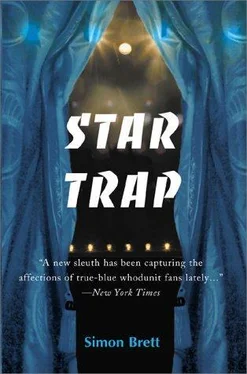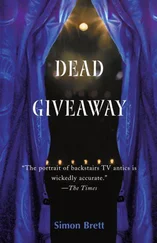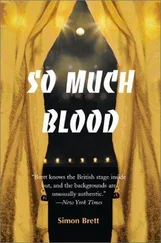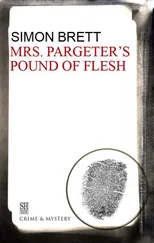Simon Brett - Star Trap
Здесь есть возможность читать онлайн «Simon Brett - Star Trap» весь текст электронной книги совершенно бесплатно (целиком полную версию без сокращений). В некоторых случаях можно слушать аудио, скачать через торрент в формате fb2 и присутствует краткое содержание. Жанр: Классический детектив, на английском языке. Описание произведения, (предисловие) а так же отзывы посетителей доступны на портале библиотеки ЛибКат.
- Название:Star Trap
- Автор:
- Жанр:
- Год:неизвестен
- ISBN:нет данных
- Рейтинг книги:5 / 5. Голосов: 1
-
Избранное:Добавить в избранное
- Отзывы:
-
Ваша оценка:
- 100
- 1
- 2
- 3
- 4
- 5
Star Trap: краткое содержание, описание и аннотация
Предлагаем к чтению аннотацию, описание, краткое содержание или предисловие (зависит от того, что написал сам автор книги «Star Trap»). Если вы не нашли необходимую информацию о книге — напишите в комментариях, мы постараемся отыскать её.
Star Trap — читать онлайн бесплатно полную книгу (весь текст) целиком
Ниже представлен текст книги, разбитый по страницам. Система сохранения места последней прочитанной страницы, позволяет с удобством читать онлайн бесплатно книгу «Star Trap», без необходимости каждый раз заново искать на чём Вы остановились. Поставьте закладку, и сможете в любой момент перейти на страницу, на которой закончили чтение.
Интервал:
Закладка:
The club was now lost in a forest of concrete blocks. Two of the tennis courts had been sold for development and the others were now pink shale stained with moss. The only rugby discussed in the bar was what was seen on the television and the Saturday dances had been replaced by intermittent bookings for disco-parties (which were rarely profitable because of the number of broken windows). The members had gone down in class and numbers. They tended to lounge around in jeans and patterned pullovers, propped against the moth-eaten baize of the old notice-boards, occasionally throwing a desultory dart or pulling without hope at the arm of the one fruit machine. When they got drunk, they still broke into mournful song.
The club had one paid employee, who doubled the roles of caretaker and barman. His name was Griff and he spent whole days propped over the bar reading an apparently inexhaustible copy of the Sun.
The club activities could not possibly make any profit, but the Welsh Dragon stayed open. All its revenue came from hiring out rehearsal rooms. There were two — one where old cue-racks and brass score-boards against treacle-coloured panels accentuated the absence of the long-sold billiard tables, and the other, grandly called the ‘Ballroom’, a long expanse of bare boards with a tiny stage at one end and a wall of French windows which in the old days were left open for dances after summer tournaments. Many of the window panes had been broken and covered with asymmetrical offcuts of hardboard.
Charles was directed to the Ballroom, where a flotsam of chairs and upturned benches represented the expensive set of Lumpkin! (The designs, by Derbyshire Wilkes, were elaborate and featured considerable use of revolves and flown pieces.) The scene was like any morning in any rehearsal room. Actors and actresses sat on chairs round the edges of the room like the sad wallflowers who had once moped there after missing vital backhand returns in the mixed doubles. Little clusters formed round crosswords or gossip. Bleary bodies shuffled slowly out of the cocoons of their coats. A member of the stage management moved purposefully around the room, following some logic of her own. Hangovers and television were discussed, knitting was unwound.
The director, David Meldrum, was poring over the script at a small table isolated in the middle of the room. He was balding, with rimless glasses and somehow managed the pinched look of a clerk from a Dickens serial. Charles knew him by sight and introduced himself.
‘Ah, Charles, hello. I gathered your name was being mentioned for the part. Nice to see you.’ He did not seem particularly interested in the addition to his cast. ‘Gwyneth will give you a rehearsal schedule.’
At the mention of her name, the stage management girl homed in and handed Charles a cyclostyled sheet of times and scenes. Instinctively he assessed her. Old habits die hard and one of the first moves on joining any company is to examine the available crumpet. He decided that Gwyneth looked too dauntingly efficient for his taste. Not a high cuddlability rating.
As he sat down to study the schedule, Charles reflected that it was rather pathetic for him still to be studying the crumpet. He was nearly forty-nine years old and his emotional track record was not spectacular. There was a nice wife, Frances, in Muswell Hill, with whom he hadn’t lived for fourteen years (in spite of occasional reconciliations) and who was now reputed to have a boy friend. Apart from her, it was a history of intense casual affairs, which were either too intense or too casual. Thinking about it depressed him, so he channelled his thoughts in another direction.
It was strange that David Meldrum had accepted his appearance so casually. Indeed, it was strange that the director had had no part in his selection for the role. ‘I gathered your name was being mentioned for the part.’ As if it had nothing to do with him. Charles racked his brains for any stray comments he had heard about the director and from some source he couldn’t identify he remembered the words, ‘A good technician, love, but about as much imagination as a bread-board. Ought really to be in local government. Approaches a production like planning a car park.’ That made sense. David Meldrum was a director who would see that the show got on the stage. He might not have many ideas of his own, but at least he wouldn’t argue with anyone else’s. Charles felt certain that Christopher Milton’s contract also included an Approval of Director clause.
He looked round for the star, but there was no sign of him. Five to ten. Perhaps he was one of those actors who makes a point of arriving just at the moment of the call.
As the room filled up, there were one or two familiar faces from a long time ago. He saw Michael Peyton, with whom he’d worked on his own production of She Stoops to Conquer in Cardiff. They grinned at each other across the room. A couple of other actors smiled vaguely, as unable to remember Charles’ name as he was to remember theirs.
There were few actresses. Thinking of the original play, Charles could only remember three female characters — Mrs Hardcastle, Kate Hardcastle and Miss Neville. He identified them easily. The middle-aged lady in a tweed trouser-suit and a scallop of blue-grey hair he recognised as Winifred Tuke. Good workmanlike actress. He remembered once overhearing her saying, ‘Been a feature player all my life and very happy at it — I’ve never wanted to be a star.’ She must be playing Mrs Hardcastle. The thin girl with aquiline nose and straight blonde hair must be Miss Neville and the shorter one whose mouth and teeth were attractively too large looked absolutely right for Kate Hardcastle.
Michael Peyton came over to chat and confirmed the identification. The girl playing Kate was called Lizzie Dark, apparently only a year out of Sussex University and generally believed to have a glowing future.
‘Nice looking kid, isn’t she?’ Charles observed.
‘Yes. Fairly regular boy friend. Often comes and picks her up after rehearsals.’
‘Oh, I wasn’t thinking…’
‘Of course you were.’
‘Well…’
‘There’s always the tour.’
‘Hmm.’
‘And the dancers.’
‘When do they join us?’
‘Next week. They’re rehearsing separately.’
‘How the hell do dancers fit into She Stoops to Conquer?’
‘If you think this show bears any relation to the play as we did it in Cardiff, you can’t have read the script.’
‘True. I’ve only read my scenes.’
‘There’s an actor for you. I hope you didn’t count your lines.’
‘No,’ he lied.
David Meldrum stood up and moved to the centre of the set in a rather apologetic way. ‘Um, perhaps we ought to start.’
He was interrupted by the entry of a man in a donkey-jacket, who whispered something to him and sat down on a chair adjacent to the table. He had brown curly hair and a boyish face with a snub nose, but his skin belied the impression of youth. It had that papier-mache quality which is the legacy of bad acne.
‘Who’s he?’ Charles hissed.
‘Spike. He’s the stage manager. Nice bloke. He must be down to see if we’re actually going to be able to negotiate Derbyshire Wilkes’ amazing set. Of course, there’s always the stage staff,’ he added irrelevantly.
‘What do you mean?’
‘Potential crumpet.’
‘I’m too old.’
‘Come off it. Nothing like a warm little props girl to comfort a chap in his old age.’
‘Um, I think we should make a start,’ said David Meldrum.
‘Where’s the star, Michael?’
‘Oh, he’s never called till ten-thirty. It’s in his contract.’
In 1773 Oliver Goldsmith decided that Sir Charles Marlow should not appear in his play until the fifth act, so Charles Paris’ rehearsal schedule was not too onerous. That much had survived the translation of She Stoops to Conquer into Liberty Hall and even the transmogrification of Liberty Hall into Lumpkin! The result was that, although there was ground to be made up and Charles would have to go through his scenes with the assistant director and be taxied off to Soho for a costume fitting that afternoon, he was not actually called for the morning. And because Griff the barman interpreted such concepts as club membership and licensing hours with a commendable degree of independence, by ten-thirty Charles and Michael Peyton were sitting in the bar over a couple of pints of bitter.
Читать дальшеИнтервал:
Закладка:
Похожие книги на «Star Trap»
Представляем Вашему вниманию похожие книги на «Star Trap» списком для выбора. Мы отобрали схожую по названию и смыслу литературу в надежде предоставить читателям больше вариантов отыскать новые, интересные, ещё непрочитанные произведения.
Обсуждение, отзывы о книге «Star Trap» и просто собственные мнения читателей. Оставьте ваши комментарии, напишите, что Вы думаете о произведении, его смысле или главных героях. Укажите что конкретно понравилось, а что нет, и почему Вы так считаете.












